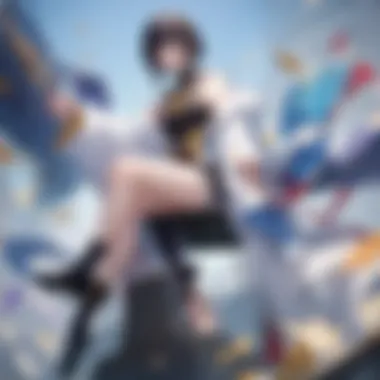Navigating the Ethics of Illegal Manhwa Reading Sites


Intro
Illegal manhwa reading sites have become a pervasive element of the digital landscape, raising daunting ethical questions. Understanding these platforms' use provides a necessary context, especially for avid manhwa readers. The complex relationship between accessibility and legality makes it crucial to analyze how these sites affect fellow readers, creators, and the manhwa industry at large.
Tens of thousands of readers access these illegal sites every day. Many platforms feature manga and manhwa that can otherwise be difficult or impossible to find in some markets. This availability can seem appealing, but it is vital to recognize the potential implications entailed in its use.
One critical topic in this discussion concerns how illegal availability impacts local markets and creators. Reading habits often mold a community’s views on artists and writers, not to mention the financial aspects. Creators struggle to earn fair compensation for their intellectual property. Moreover, new readers, unaware of the consequences of their actions, often unknowingly contribute to this detrimental cycle.
Studies indicate that illegal reading can severely impact sales and diminish publishers' motivation to distribute tales that may find their audience appreciatively. Though some readers may argue that their fixed income restricts access, the fundamental issue remains: are indiscriminate digital habits harmful in the long run?
This exploration will also uncover whether looking for complete comprehension can lead to better practices. By engaging in this critical dialogue, readers may find a dialogue that's broader than consumption, one that addresses stewardship of creativity and investment in supporting the artistic ecosystem.
Understanding Manhwa
Manhwa is more than just a form of entertainment. It is a significant cultural artifact that roots in Korean society, merging contemporary narratives with historical contexts. This section delves into the essence of manhwa, detailing its definition and origins and examining how its cultural significance shapes the reading practices of enthusiasts.
Definition and Origins
Manhwa refers to comics or graphic novel style published in South Korea, distinct in style and narrative from its Japanese counterparts. It came into prominence in the late 20th century, emerging from earlier forms of Korean comics, known as
The Appeal of Manhwa
Manhwa, a term commonly used to describe a style of South Korean comics, has garnered significant attention both regionally and globally. This increasing popularity contributes to questions surrounding its rightful distribution and the ethics of illegal reading platforms. Understanding the appeal of manhwa involves appraising multiple components, such as artistic style and storytelling techniques, which connect deeply with readers.
Artistic Style
The artistic style of manhwa plays a critical role. Visually, manhwa is characterized by its distinct aesthetic, which sets it apart from traditional manga. The fluid, expressive characters call artists assess emotional expressions plus backgrounds often display greater detail. This creates not just a visual reading experience but transports the reader into expansive worlds, drawing them into stories within.
Readers often note the direction of character design in manhwa, which leans towards more defined facial features and vibrant exclamations. Such characteristics provide a visual feast that speaks to many, adding to why it is so popular. Notably, the coloring techniques while digital aid in creating momentum and change not only within the visuals but in the narrative pacing. Readers admire how this combination affects overall engagement.
Visual Narratives and Trends
The emergence of webtoons—horizontal strips ideal for mobile screens—marks a shift in the format admired in manhwa. They denote a crucial adaptation catering to digital-first audiences. As people seek accessibility, platforms such as Tappytoon or Webtoon amplify appeal by providing varied genres and targeting wider demographics. This evolution showcases adaptability both in aesthetic presentation and in catering to consumer expectations, expanding m 'anwa's reach.
Storytelling Techniques
The encapsulation of storytelling within manhwa serves as another pull factor. Generally, the narratives tend to be driven by intricate plots supplemented by character development that offers a depth that captivates readership base.
Themes often rotate around social issues, personal struggle, and romance. Readers reconnect with this content, often left pondering layers of meaning. For instance, many series unveil intricate dynamics that encourage onscreen discussion among readers. These engagements foster community discourse, enabling avid fans to dissect characters and duality within plots.
Non-linear storytelling
Some manhwa challenge formats, picking non-linear narratives where sometimes readers receive multiple perspectives reflecting contrasting goals and motivations. This technique ceates tension and can lead to a richer storytelling experience.
Overall, the appeal of manhwa lies fundamentally in its artistic aesthetics and compelling narrative techniques. These elements pull readers in and taper into deeper conversations about representation, whereby discussions around accessibility heightens. Not only do readers enjoy beauty in art, but they crave meaningful stories illustrated thoughtfully through skilled artistry.
Legal Context of Manhwa Distribution
Understanding the legal framework surrounding manhwa distribution is essential for both readers and the industry. It helps contextualize the challenges that creators face against illegal platforms. Knowledge of copyright and international licensing informs enthusiasts about the importance of supporting legal avenues for access. This awareness encourages ethical decisions and nurtures respect for creators' rights.
Copyright Issues


Copyright issues lie at the crux of manhwa's legal concerns. Manhwa creators own the rights to their work, which protects them from unauthorized reproduction or distribution. Understanding local copyright laws can be a complicated process, as these laws differ globally. Noteworthy is that in South Korea, where manhwa originates, there are explicit protections enabling creators to claim their rights.
Readers must understand the impact of viewing pirated content. When individuals access illegally shared manhwa, they unintentionally contribute to a decrease in income for authors and publishers. This situation leads to fewer resources for future publications, causing gaps in the industry that impacts enthusiasts negatively.
Legal action against copyright infringement can also pose risks to both platform operators and users. Lawsuits can result in hefty fines or criminal charges. Consequently, readers engaging with illegally accessible manhwa may find themselves on shaky ground in the eyes of the law, not fully realizing the potential ramifications.
International Licensing
International licensing adds another layer of complexity to manhwa distribution. Licensing agreements allow for the legal crossover of manhwa from South Korean publishers to international distributors. This process is vital for maintaining a legal framework while increasing the availability of manhwa in various language markets.
When publishers license their works, they assure readers of quality translations and authorized distribution. A respectable practice is direct engagement with truncates collectors through platforms like Webtoon and Tapas. Here, unique licensing deals ensure authors are compensated while global audiences have access to an array of genres and series.
Without international licensing, platforms may distribute pirated content without authoirzation. This not only threatens their survival but also underscores the illicit nature of illegally accessible manhwa. When contemplating the future of manhwa, fostering an understanding of the licensing process is crucial. Enthusiasts can play a role in advocating for ethical chairmate by supporting licensed content, helping to rely ethical distribution practices in their networks.
“Supporting licensed platforms fosters an environment where creators can thrive and produce more content for all to enjoy.”
Illegal Manhwa Reading Platforms
Illegal manhwa reading platforms present significant challenges and opportunities within the manga ecosystem. Understanding these digital spaces helps recognize their popularity among readers. These sites provide easy access to content that might be difficult to find using official channels. However, this accessibility comes with caveats as legality and ethical implications surround their use. Illegal platforms influence the perception of manhwa and contribute to the overall economy of the manga industry.
In this section, we need to scrutinize the factors contributing to how these platforms operate and attract viewers. Different popular sites continue to thrive despite recurring legal shadows. It's also important to understand what makes users turn to these sources.
Overview of Popular Sites
When it comes to illegal manhwa reading platforms, several key websites stand out due to their large user base and vast content offerings. Examples of such platforms include MangaDex, Manhwa-World, and MAngapark. Each of these sites hosts thousands of chapters and entire series, providing easy access for readers.
The following are elements of popular platforms:
- Vast Library: Many of these sites offer an extensive library that spans across not only manhwa but also manhua and traditional manga. This helps create a more versatile reading experience.
- User Interface: Many sites invest resources in user-friendly interfaces. This enhances the read experience and keeps visitors engaged.
- Community Features: Chat forums or comment sections often exist on these sites, allowing users to interact and discuss various titles. This feature fosters a sense of community.
However, the ease of access and extensive offerings come at a price in matters of legality.
User Demographics and Behaviors
The user demographics for illegal manhwa reading platforms typically reveal a tech-savvy audience. Readers range from teenagers to young adults, primarily coming from diverse cultural backgrounds. This spectrum speaks volumes about the global nature of manhwa.
Notably, the behaviors exhibited by these users are remarkably influential. Many choose illegal platforms due to:
- Cost-Effectiveness: Availability of free content is often a driving factor, as many fans are unwilling or unable to pay for legitimate subscriptions.
- Immediate Availability: Updates appear faster on these platforms, often ahead of official translations. This quick access enhances the appeal of such sites.
- Title Availability: Some users turn to these platforms simply because their favorite titles may not be accessible through legal means.
As we analyze these user profiles, the intersection of preferences and digital behaviors comes into sharp focus, illuminating broader trends within the manga economy and hints at why some find these platforms necessary despite potential regard for legality.
In reclaiming narratives around manhwa and its online availability, ongoing conversations about value in content and where it is sourced from raise critical questions about legality and responsibility.
Risks Associated with Illegal Reading
The topic of risks associated with illegal reading merits close examination as it unveils significant implications affecting readers, creators, and the industry. Engaging with illegal manhwa platforms can seem tempting due to easy accessibility and no cost, but these avenues can lead to more problems than benefits. They foster an environment where intellectual property rights are violated and deprive artists and writers of their deserved recognition. By understanding these risks, one can better navigate the complexities surrounding illegal readings and contribute positively to the community.
Legal Repercussions
Participating in illegal reading can result in substantial legal concerns. Copyright infringement is a primary concern here, as creators retain exclusive rights over their work. Violating these rights not only compromises the livelihood of the artists but can open consumers to liability. Legal actions might not be frequent against individual readers, but laws are tightening globally,forming the basis for potential prosecution.


Situations to consider include:
- Fines ranging from manageable to significant, dependent on the degree of infringement.
- Legal notices from copyright holders, which can be distressing for readers.
- Potential civil lawsuits seeking damages.
In extreme cases, authorities may prosecute not just website operators but also users. Adherence to legal norms connected to media consumption is crucial, as ignorant consumption of manhwa on these platforms could have unexpected serious consequences.
Readers should stay informed: Legal engagement attended by unethical practices can lead to unforeseen repercussions expanding beyond mere fines.
Cybersecurity Threats
Aside from legal issues, illegal reading platforms pose serious cybersecurity challenges. Many of these sites lack robust security protocols, which increase vulnerability to various online threats. Reader safety often diminishes in places where illicit content thrives. Here are aspects of cybersecurity risks to consider:
- Malware infections: Accidental downloads or exposure on unreliable platforms can lead to malware infusions in personal devices. This risk jeopardizes stored information.
- Phishing attempts: Users might unsuspectingly provide critical personal details, allowing attackers to exploit this sensitive information for ill purposes.
- Adware and Pop-ups: Unwanted ads may track user behavior and unwittingly entice readers into compromising situations.
Given these steep risks, proactive caution is recommended for any user involved in manhwa reading. Using reliable anti-virus software, abstaining from dubious websites, and seeking stable platforms becomes paramount—not only for enjoyment but for fundamental safety.
Creating awareness and ensuring enjoyment ought not think of short-term they may find at hand now but look well the latter implications of those actions might bring. Readers empower themselves by making informed choices. Such practices not only help protect individuals but also support the overall health of the manhwa community.
Alternatives to Illegal Reading
In the midst of ever-growing accessibility to diverse media through the internet, the importance of exploring alternatives to illegal reading practices cannot be overstated. This section aims to delineate viable and moral routes for manhwa enthusiasts to access content without violating copyright or ethical conventions. It is crucial for both readers and creators that we encourage the practice of ethical consumption, fostering a vibrant ecosystem where art can thrive legitimatey.
Official Digital Platforms
Official digital platforms represent the first line of defense against illegal reading sites. These platforms not only ensure that content creators receive the financial support they deserve, but they also provide users with high-quality translations and enhanced reading experiences. Notable platforms include Webtoon and Tapas, each offering a comprehensive library of manhwa alongside a user-friendly interface.
Benefits of using official digital platforms include:
- High-Quality Content: Readers gain access to professionally-translated stories featuring coherent narratives and polished artwork.
- Secured Investments: By utilizing these platforms, users actively contribute to the sustainability of the manhwa industry.
- Wealth of Choices: Many sites offer a diverse array of genres catering to varied tastes, ensuring that readers discover something they enjoy.
While the subscription costs or in-app purchases may seem annoying, they form a crucial lifeline for artists. Paying for content guarantees ongoing creation and new stories.
Support for Artists and Creators
The role of readers in supporting their beloved artists is paramount. It extends far beyond simply accessing their work; it includes forming connections and promoting the culture that nurtures this creative field. By making ethical choices in their reading habits, readers can influence the future of the industry positively.
Some ways to support artists effectively include:
- Purchasing Merchandise: Many creators offer products such as prints, apparel, or art books, which not only demonstrate allegiance but also directly enrich artists.
- Crowdfunding Platforms: Engaging with platforms like Patreon allows readers to connect with creators on a personal level while contributing to the capital necessary for productions.
- Social Media: Engaging with content through liking and sharing emphasizes creator visibility. Platforms like Facebook and Reddit can become viable links between fans and creators when used to share updates.
Engaging with the artist community rather than lurking on illegal reading sites fosters the valuable dialogs and interactions that empower the entire community.
By alternative means, readers put their monetary resources where they find value, sustaining an industry that nourishes them.
These explorations signify not just legal compliance but a solidarity with artists and creators creatively investing their lives in the artforms they produce. It sparks the potential for renewed creativity and innovation within the manhwa industry.
Community Discussions and Perspectives
The section focusing on Community Discussions and Perspectives encompasses crucial insights into how the manhwa community theorizes the ramifications of illegal availability. It is essential to address the contrasting viewpoints of enthusiasts and the industry to shed light on the complexities involved in manhwa reading practices. Understanding these discussions aids in highlighting the ethical considerations and the sources of potential conflict, thus enriching readership engagement with the topic.
Views from Enthusiasts


Enthusiasts exhibit a robust connection to manhwa, often relying on it as an escape or hobby. The willingness of some community members to access illicit materials stems from a desire for immediate gratification. Many find themselves entangled in a system where legal options often feel insufficient or delayed in matching fan demand.
However, this perspective lacks acknowledgment of the harm caused to creators. A segment of readers emphasizes the notion of support for artists, advocating a careful balance. Discussion forums thirst for deeper engagement, gathering like-minded individuals who argue about creators' financial rights while wrestling with a lack of available works suited to their preferences.
In online platforms, debates unfold surrounding easy access versus the moral obligation to fund artistry properly. Some group members adhere passionately to ethical consumption, rallying others to use legitimate sources like Webtoon or Tapas instead. The statistic from Reddit discussions indicates that a significant portion of those engaged in these conversations feel guilt when consuming illegal content. They express a clear desire for more convenient legal avenues that respect the labor of manhwa creators.
Industry Perspective
The industry perspective on this issue emphasizes the tangible consequences of illegal availability. Manhwa publishers spend considerable resources on talent development and distribution networks. However, illegal sites upend these efforts. Talent and investment ahe the danger as revenues dwindle from the theft of content.
From a preventive stance, companies are adapting. They explore solutions like subscription models and greater international licensing effort to appeal to broader readerships. Some companies have initiated swift action by filing complaints against illegal platforms. This approach demonstrates commitment not only to profit but also to securing a sustainable environment for future creators.
The industry recognizes a need to harness technology effectively to combat unauthorized sharing. Advertising campaigns are being structured, focusing on bringing attention to legal sources, emphasizing the value of original content, and the chance to directly sustain artists.
In essence, exploring both enthusiast viewpoints and industry responses removes the simplistic label of 'illegal readers' or 'money-hungry publishers'. Each has stakes in a delicate balance which, if disrupted too significantly, has grave implications for the manhwa landscape as a whole. The dialogue remains vital, embodying the ongoing negotiation of interest between readers and creators without which the future of this cherished art form may be jeopardized.
Future Trends in Manhwa Distribution
Understanding the future trends in manhwa distribution is pivotal for several reasons. As a cultural phenomenon, manhwa transcends geographic barriers. Emerging modes of consumption and viewer accessibility continuously shape how readers engage with content. Awareness of these trends contributes not just to readership but also to the evolving dynamics of the industry itself.
Evolving Reader Preferences
Readers today exhibit diverse preferences shaped by various factors, including technological advancements and social media influence. Young audiences display an increasing inclination towards digital platforms which enable easy access to diverse titles. Additionally, decentralized platforms give opportunities for interactive reading experiences. This trend reflects a shift from traditional print media to convenient digital access. Readers favor platforms that offer instant gratification, social features, and community interactions.
- Global Access: These platforms offer the chance for wider readership and more cultural exchange. Titles may gain popularity before being officially licensed internationally.
- User Customization: Opting for personalized settings and options maximizes individual engagement with the story. Customized interfaces cater to varying reading needs.
This evolving nature challenges traditional distribution partners. It is becoming necessary for established entities to also adapt to these configurations ensuring more narrowly tailored reading experiences.
Impact of Technology
Technological advancements play a significant role in the future of manhwa distribution. Innovations in distribution methods mean that platforms now operate with greater efficiency. The impact of technology is evident in several aspects:
- Mobile Reading Apps: Applications like LINE Webtoon provide a user-friendly interface aimed at maximizing user engagement. Readers appreciate layouts that facilitate scroll functionality, thus enhancing immersive reading experiences.
- Virtual Reality and Augmented Reality: The introduction of VR and AR is already shaping new methods to read and interact with manhwa. Imagine experiencing narratives enveloped with realistic environments as seen in popular visual novels.
- Blockchain for Digital Rights Management: With the prevalence of pirated works, blockchains could revolutionize provenance tracking. Artists benefit significantly when their work is protected, possibly leading to greater financial incentives for creators.
The increased accessibility through technology is driving both revenue and readership growth, enabling smaller creators to find audiences across the globe.
Legislation may pose challenges as technology evolves. Policymakers must address the balance between fostering growth and protecting intellectual property.
The future distribution trends of manhwa reflect diverse trajectories involving reader preferences and technological advancements. Both elements are necessary as they guide the industry on how people will read and engage with these works over time.
Epilogue
In this article, we have delved into the multifaceted world of manhwa reading practices, particularly focusing on the implications of illegal availability. This topic positions itself at the intersection of legality, ethics, and social responsibility within the comic and digital realms. Manhwa has unique qualities that attract many readers, but the easy access to pirated content has become a pressing issue.
Summary of Findings
Our exploration showcases the detrimental impact faced by creators and the industry from rampant illegal distribution. The legal ramifications associated with the consumption of unauthorized content cannot be overlooked. Readers often underestimate their influence on the marketplace, not realizing that each tribute to pirated platforms undermines legitimate sources. Therefore, when readers engage with illegal sites for their manhwa cravings, they contribute to depriving artists and publishers of their rightful income.
Additionally, this complex situation involves various stakeholders, including technologists, artists, and passionate fan communities. Regular debates spring up regarding access and rights. However, the ethical stance remains constant: supporting legal means of obtaining manhwa, which in turn empowers creatives and guarantees a more thriving industry for future narratives.
Call to Ethical Consumption
As enthusiasts, the call for ethical consumption serves as an urgent reminder to all readers. It is essential that the community shift its perception from viewing manhwa purely as entertainment to appreciating it as an art form that requires dedication, both from artists and society. Every time a reader seeks manhwa through illegal platforms, they inadvertently dismiss the vital support they owe to the artists, who pour their time and talent into creating such work.
Conscious choices must be made when selecting where to read or buy manhwa. Platforms like WEBTOON or ComiXology provide legal access to countless works while ensuring that profits reach the creators. With numerous alternatives available, opting for illegal to streams truly hampers development.
The responsibility rests on our shoulders to decide the fate of the art we value. Every action counts against the shift toward an ethically responsible consumption of content.















